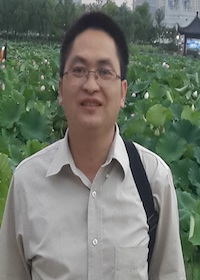
Professor, HAP
Contact Information
Email: jtang25@gmu.edu
Phone: 703-993-3697
Personal Websites
Biography
Dr. Jinshan Tang is a professor of Health Informatics in the Department of Health Administration and Policy. Before joining George Mason University, Dr. Tang was a full professor in the College of Computing at Michigan Technological University and a Founding Director of the Joint Center for Biocomputing and Digital Health. Dr. Tang’s research covers broad areas related to image processing and artificial intelligence. His specific research interests include biomedical image analysis, biomedical imaging, artificial intelligence in medicine (e.g., computer-aided cancer detection, AI for COVID-19 detection). He has obtained over three million dollars grants as a PI or Co-PI and has published more than 130+ refereed journal and conference papers. He has also served as a committee member at various international conferences. He is a senior member of IEEE and a Co-chair of the Technical Committee on Information Assurance and Intelligent Multimedia-Mobile Communications, IEEE SMC society.
Research
Research Interests
- Medical Image Analysis
- Artificial Intelligence in healthcare
- Biomedical Imaging
- Computer Aided Cancer Detection
- AI for COVID-19 Detection and Diagnosis
- Big Data Analysis
- Bioinformatics
Select Publications
- Zhengshi Chen, Juanjuan He, Xiaoming Liu, Jinshan Tang, “Entropy-Guided Dynamic Competition Framework for Semi-Supervised Medical Image Segmentation”, Applied Soft Computing, Volume 186, Part D, January 2026, 114230.
- Xiaoming Liu, Jia Zhang, Ying Zhang, Li Chen, Liangfu Luo, Jinshan Tang, “Weakly supervised segmentation of retinal layers on OCT images with AMD using uncertainty prototype and boundary regression”, Medical Image Analysis, vol. 102, 2025, 103572, ISSN 1361-8415.
- Xiaoming Liu, Xiangkai Wei, Aihui Yu, Zhifang Pan, Jinshan Tang, “Attention-based Cross-Domain Synthesis and Segmentation from Unpaired Medical Images” IEEE Transactions on Emerging Topics in Computational Intelligence, vol. 8, no. 1, pp. 917-929, Feb. 2024.
- Nan Mu, Zonghan Lyu, Mostafa Rezaeitalesh Mahalleh, Jinshan Tang, and Jingfeng Jiang, "An Attention Residual U-Net with Differential Preprocessing and Geometric Postprocessing: Learning How to Segment Intracranial Aneurysms," Medical Image Analysis, Vol. 84, 102697, February 2023.
- Xiaoming Liu, Qi Liu, Ying Zhang, Man Wang, Jinshan Tang, “TSSK-Net: Weakly Supervised Biomarker Localization and Segmentation with Image-level Annotation in Retinal OCT Images”, Computers in Biology and Medicine, Vol. 153, 106467, February 2023.
- Chaonan Chen, Kai Zhang, Jinshan Tang, “A COVID-19 Detection Algorithm Using Deep Features and Discrete Social Learning Particle Swarm Optimization for Edge Computing Device”, ACM Transaction on Internet Technology, Vol. 22, No. 3, 2022.
- X. Liu, Q. Yuan, Y. Gao, S. Wang, X. Tang, J. Tang, D. Shen, “Weakly Supervised Segmentation of COVID-19 Infection with Scribble Annotation on CT Images”, Vol. 122, 108341, Pattern Recognition, February 2022.
- Juanjuan He, Qi Zhu*, Kai Zhang, Piaoyao Yu, Jinshan Tang, "An evolvable adversarial network with gradient penalty for COVID-19 infection segmentation", Volume 113, Part B,107947, Applied Soft Computing, December 2021.
- Chen Zhao*, Aviral Vij, Saurabh Malhotra, Jinshan Tang, Haipeng Tang, Drew Pienta, Zhihui Xu, Weihua Zhou, “Automatic extraction and stenosis evaluation of coronary arteries in invasive coronary angiograms”, vol. 136, 104667, Computers in Biology and medicine, September 2021.
- Nan Mu, Hongyu Wang*, Yu Zhang*, Heng Yang*, Jinshan Tang, “Progressive Global Perception and Local Polishing Network for Lung Infection Segmentation of COVID-19 CT Images”, Pattern Recognition, 120:108168, Dec,2021
- Xiaoming Liu, Aihui Yu*, Xiangkai Wei*, Zhifang Pan*, Jinshan Tang, “Multimodal MR Image Synthesis Using Gradient Prior and Adversarial Learning,” IEEE Journal of Selected Topics in Signal Processing, vol. 14, no.6, pp. 1176 – 1188, Oct. 2020.
- X Liu, Jinshan Tang, “Mass Classification in Mammograms Using Selected Geometry and Texture Features and a New SVM-Based Feature Selection Method”, IEEE System Journal, pp. 910~920, vol. 8 No.3, 2014.
- Jinshan Tang, Steven Millington, Scott Acton, Jeff Crandall, and Shepard Hurwitz, “Surface Extraction and Thickness measurement of the Articular Cartilage from MR images using Directional Gradient Vector Flow Snake,” IEEE Tr. On Biomedical Engineering, Vol. 52, No. 5, 2006.
Honors and Awards
- The Best Paper Award, SPIE Conference on Mobile Multimedia/Image Processing, Security, and Applications, Baltimore, MD, USA, May 21, 2015.
- Achievement Award, The 2001 International Multi-conference, Las Vegas, Nevada, USA, June 25-28, 2001
- Keynote speaker, the 9th International Conference on Frontiers of Intelligent Computing: Theory and Applications, National Institute of Technology Mizoram, India, June 25 - 26, 2021.
- Keynote speaker, International Conference on Urban Intelligence and Applications, Wuhan, China, May 10-12, 2019.
- Keynote speaker, at the 14th National Symposium on Sustainable Development of Medical Information Education and the 5th National Medical Information Graduate Forum of the Chinese Medical Association Medical Information Branch, Zunyi, Guizhou, China, July 25, 2019.
- Invited talk, SPIE Conference on Intelligent Robots and Computer Vision XVIII: Algorithms, Techniques, and Active Vision, Boston, 1999.
- Top 10% of teachers for student evaluation in MTU (Spring Semester 2014)
- Postdoctoral Fellowship, National Institutes of Health 2004-2005
- Postdoctoral Fellowship, Harvard Medical School, 2000-2001
Professional Affiliations/Memberships
- Co-Chair, Technical committee of Information Assurance & Intelligent Multimedia- Mobile Communications of the IEEE Systems, Man, and Cybernetics Society (2016~)
- Senior Member, Institute of Electrical and Electronics Engineers (IEEE) (2003~)
Degrees
- Post-doctoral training, National Cancer Institute, National Institute of Health
- Post-doctoral training, Schepens Eye Research Institute and Department of Ophthalmology, Harvard Medical School.
- Ph.D., Telecommunication and electronic system, Beijing University of Posts and Telecommunications,1998
- MS, Control theory and applications, Heilongjiang University, 1995
- BS, Math education, Xiangtan Normal University, 1992
